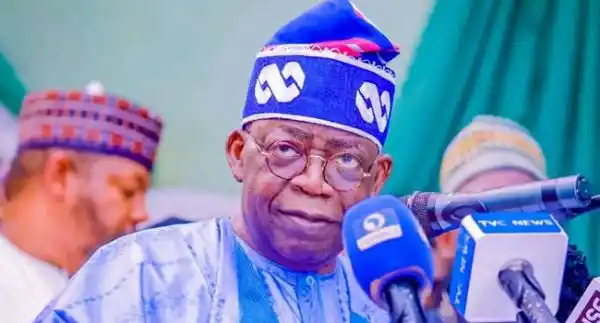TINUBU: PEPT lacked jurisdiction to enforce a US Court order of $460,000 forfeiture

Lawyard is a legal media and services platform that provides…
Nigeria’s President-elect, Bola Tinubu, on Wednesday, told the Presidential Election Petition Tribunal (PEPT) it lacked necessary jurisdiction to enforce a purported decision of a United States District court that ordered the forfeiture of the sum of $460,000 in some US bank accounts linked to him in 1993.
Tinubu, who stated this in his response to the petition filed by the Labour Party presidential candidate, Peter Obi, against his victory at the February 25 presidential election, further hinged his argument on the fact that the said US court order was never registered in any Nigerian court.
This is as the ruling All Progressives Congress (APC), yesterday, joined the Independent National Electoral Commission (INEC) in calling for the dismissal of the petition filed by the Peoples Democratic Party (PDP) and its candidate, Atiku Abubakar, challenging the declaration of Tinubu as winner of the February 25 presidential election.
The party, in a Preliminary Objection to the petition, also claimed that the tribunal had no jurisdiction to adjudicate on the petition on the grounds that it lacked necessary facts or particulars as required by law.
Obi and LP had in their petition argued that Tinubu was not qualified to contest the presidential election, owing to the forfeiture of the said funds in accounts linked to him and as such be disqualified and all votes accrued to him in the election be declared as wasted votes.
But in the reply filed on his behalf and the Vice President-elect by their team of lawyers led by Chief Wole Olanipekun, SAN, Tinubu amongst others argued that the decision of the US District Court could not be enforced since it was neither registered nor domesticated in any court in Nigeria.
While pointing out that the judgment delivered on October 4, 1993, was not rendered by a court or tribunal created pursuant to Section 6 of the 1999 Constitution, he claimed that the decision “was not in respect of any cause of action or offence created by an Act of the National Assembly or law of a state, any subsidiary legislation or instrument under the provisions of a law in Nigeria or written law in Nigeria.
“This honourable court lacks the jurisdiction to enforce the purported decision of the US district court as sought and alleged under by the petition, the said decision having not been registered in any trial court or domesticated in any court in Nigeria.”
Besides, the second and third respondents, argued that Tinubu was not a party or defendant in the said case No 93C-4483.
“The 2nd respondent was/is not one of the listed parties in the decision of the United States district court in case No 93C-4483 delivered on October 4, 1993 as reproduced in paragraph 28 of the petition.
In addition, Tinubu said the petitioners did not disclose a reasonable cause of action cognizable under Sections 131, 134 and 137 of the 1999 Constitution and Section 134 of the Electoral Act, 2022.
The respondents pointed out that the case of the petitioners as pleaded has not disclosed any disqualifying factor as prescribed by Section 137 in that Tinubu was not under death sentence imposed by any competent court of law or tribunal in Nigeria or any jurisdiction at all.
“The 2nd respondent is not currently under a sentence of imprisonment or fine for any offence involving dishonesty or fraud imposed by any competent court of law or tribunal in Nigeria.”
In addition, it is the case of Tinubu and Shettima that the case not presented within a period of less than 10 years before the date of the election as stipulated by the Constitution adversely affected their case.
Besides, the respondents argued that the case was not a case of criminal forfeiture cognizant under 18 USC 982, which deals with criminal forfeiture, but rather a civil case for civil forfeiture under 18 USC 981, which the US instituted as a civil plaintiff against identified properties (not persons) as defendants.
Tinubu also argued that the final orders of judge John Nordberg were made pursuant to a settlement agreement (in the mold of a consent judgment) under the court’s civil jurisdiction in 18 USC 981.
In asking the court to dismiss the petition they submitted, he argued that the grounds contained therein and all the pleadings in support of same were academic and unable to confer any benefit on the petitioners.
Responding to the request for disqualification of Tinubu on account of alleged unlawful nomination of his running mate, the respondents submitted that the petitioners not being members of the APC lacked the locus standi to query the nomination of candidates on the platform of the APC.
In addition, they said the case of Obi and LP has become statute barred, having failed to challenge the said nomination of the second respondent within 14 days of the date and events specifically pleaded in the petition.
“All issues which relates to Tinubu and Shettima qualification are pre-election issues in respect of which the Court of Appeal, sitting as the tribunal does not have jurisdiction to entertain.
“Allegation of double nomination of an associate/running mate as made in the petition is not a cognizable basis for disqualification of the winner of a presidential election under the 1999 Constitution,” they submitted.
Lawyard is a legal media and services platform that provides enlightenment and access to legal services to members of the public (individuals and businesses) while also availing lawyers of needed information on new trends and resources in various areas of practice.













